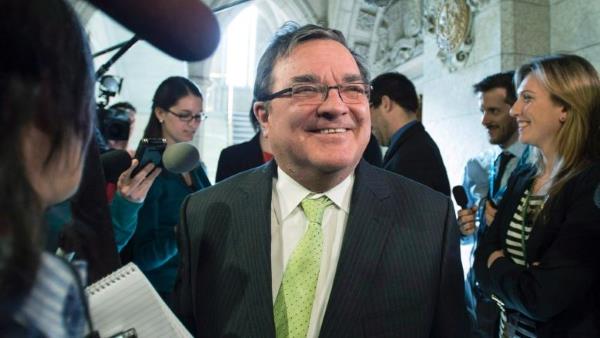Minister of Finance Jim Flaherty speaks with reporters as he leaves question period in the House of Commons on Parliament Hill in Ottawa on Thursday, March 6, 2014. Justin Tang/Canadian Press
Minister of Finance Jim Flaherty speaks with reporters as he leaves question period in the House of Commons on Parliament Hill in Ottawa on Thursday, March 6, 2014. Justin Tang/Canadian Press cbc.ca 7 hours ago | By CBC News of cbc.ca
Federal Finance Minister Jim Flaherty has resigned from cabinet to prepare for work in the private sector, he announced in a news release Tuesday.
"Yesterday, I informed the prime minister that I am resigning from cabinet. This was a decision I made with my family earlier this year, as I will be returning to the private sector," Flaherty said in a statement.
Conservative sources told CBC News that Flaherty spoke to his family at Christmas and made the decision then. He started calling close friends at 4 p.m. ET Tuesday, after the markets closed, to let them know of his decision.
Flaherty isn't immediately going to a job in the private sector.
"As I reflect on my almost two decades in politics, I am proud of the accomplishments of the governments I was part of, provincial and federal.... Now, I will focus on life beyond politics as I return to the private sector. I believe that I have served my country, province and constituents of Whitby-Oshawa to the best of my abilities and thank them for their continued trust and support for almost two decades," Flaherty said in the statement.
Flaherty is staying on as an MP for the time being, his spokesman told CBC News.
Replacement to be named Wednesday
Prime Minister Stephen Harper said in a statement that he accepted Flaherty's resignation reluctantly.A replacement will be named Wednesday, sources confirmed to the CBC's Rosemary Barton.
"In a political career of almost 20 years, Minister Flaherty has exemplified the best qualities of those who enter public life: a true commitment to service, and a sincere desire to leave the country in better shape than it was when he entered politics," Harper said.
"Since 2006, he has been a steady hand, ably guiding Canada through the most challenging economic times since the Great Depression and gaining the country a solid global reputation for economic management."
Flaherty was Harper's only finance minister. He was an MP who carried a great deal of influence in the Conservative caucus. The cabinet ministers thought to have the heft to replace him also tend to be the ones considered potential leadership candidates, were Harper to retire.
Early contenders include:
- Foreign Affairs Minister John Baird.
- Treasury Board president Tony Clement.
- Trade Minister Ed Fast.
- Employment Minister Jason Kenney.
- Industry Minister James Moore.
- Natural Resources Minister Joe Oliver.
- Transport Minister Lisa Raitt.
Flaherty differed from Harper last month over a 2011 campaign promise to offer income splitting to couples with children. Kenney said he wants the party to stick with the promise, despite Flaherty's opposition.
Battled health problem
Flaherty has spent more than a year dealing with health issues and has faced repeated questions about whether he would retire. A year ago, Flaherty disclosed he was being treated for a serious dermatological condition known as bullouspemphigoid. The treatment involved taking a strong steroid called prednisone, which is often accompanied by serious side-effects.
Flaherty said in his statement that he is "on the road to a full recovery" and that his departure from politics is "not related in any way" to his health.
Last November, Flaherty told reporters he would run in 2015, but last month said in an interview that he wasn't sure.
New Democrat finance critic Peggy Nash said Flaherty had a "tough, tough job" during the recession and that he performed well, but that many people still haven't recovered from the recession.
"There are other decisions that Jim Flaherty and the Conservative government took that certainly our party disagreed with in terms of cutting programs and services, changes to [Employment Insurance], bringing in austerity measures rather than continuing with some modest stimulus to help the economy fully recover," Nash said.
"There are political and economic differences. Having said that, no one would doubt the sincerity and work ethic of Jim Flaherty."
'Hack and slash'
Liberal Deputy Leader Ralph Goodale said it will be tough for the government to fill the hole created by Flaherty's departure from the finance role.
"I think he'll also be criticized for that focus [on cutting spending] because it was to the exclusion of everything else and, quite frankly, you cannot hack and slash your way to prosperity. You also need to invest in the underpinnings of growth, like infrastructure, for example, and post-secondary education," Goodale said.
"We will disagree about his policy accomplishments or failures, that's natural in political life. But on a day like this when he has stepped aside, I certainly want to wish him well."
Former MP Ted Menzies, who was Flaherty's parliamentary secretary for three years, said Flaherty was the longest-serving finance minister in the G7 when the global recession hit.
"He provided leadership and guidance. So not only did he guide us through it, he helped other countries through it as well," said Menzies, who retired last year to become president of CropLife Canada.
Flaherty's focus on slashing from the federal budget to return to balance from deficit, however, drew criticism from the groups whose funding was cut.
Menzies said staying focused on the goal of a balanced budget was important.
"That's why we're in the position that we're in today ... it's that kind of dogged determination to see it through," he said.
Mobile users click here to see Twitter reaction to Flaherty quitting cabinet.

